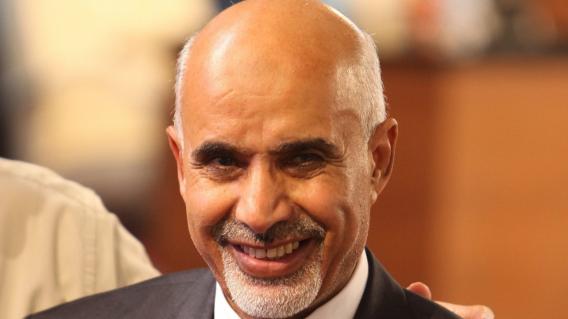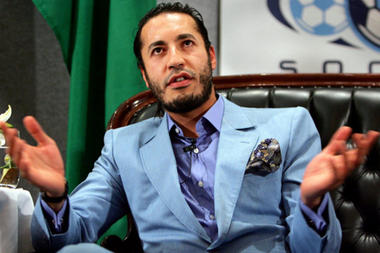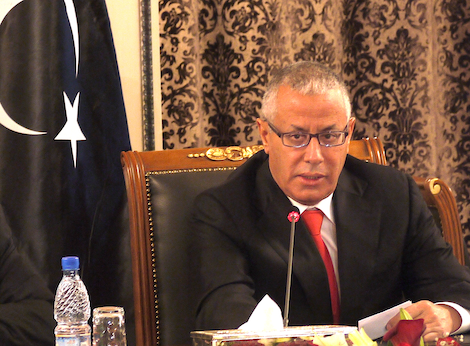By Sufyan Maghur.

Tripoli, 25 November:
I have been following, as any other Libyan, the activities of the General National Congress and its . . .[restrict]President’s activities, trips and announcements and I started to wonder is he the President of Libya? I decided to go back and read the 2011 Constitutional Declaration that governs the GNC and defines its mandate to understand the situation.
As he is travelling abroad, meeting foreign heads of states and making pledges and announcements in and out of Libya regarding various decisions, it is obvious that GNC President Magarief is acting as president of the country. But is he?
My understanding is that Magarief is only a representative of his constituency to the GNC with no special or extra mandate over any of the other 199 GNC members. He has not been elected in a presidential campaign or submitted any presidential programme. The only difference is that he has been elected by his peers to be president of the GNC. So what are the mandates of the GNC members? And what are the responsibilities of its president?
Under the amended Article 30 of the Constitutional Declaration, which defines the GNC and its mandates, there is no indication that the GNC is a Presidential Council nor does it give it any executive powers. Equally, there are no special privileges or authorities given to its president outside of the boundaries of the GNC.
Though article 17 states that the NTC (or the GNC today) is the highest authority in the country, it speaks of the GNC as an integrated body and does not recognise any authority for its president. Therefore, and with the lack of defining or attributing any competence to the president, the GNC president is merely a member of GNC who has administrative competence. He cannot take any unilateral decisions, let alone the authority to tie Libya with any commitment. Any such commitment without the collective decision of NTC/GNC members in accordance with the Constitutional Declaration is void and illegal.
The mandates of the GNC are very clear and are limited to appointing a Prime Minister to lead a transitional executive branch that will govern Libya until a constitution is drafted and approved, the selection of the constitutional committee (until a new amendment was announced), the drafting of the election constitution and voting law and overseeing the national elections. These mandates are very simple and clear.
The GNC has expanded its mandates without revising the original Constitutional Declaration and its president has exercised new powers and authorities without even the approval of the GNC members themselves. In fact,in my interpretation of the Declaration, GNC members have no authority to grant themselves nor their president any extra powers.
Magarief has been travelling to many countries and meeting with foreign leaders which may give the impression that he is the president of Libya. I just wonder who is funding these trips? And shouldn’t these trips and meetings be done by the prime minister or the foreign minister?
So why is this happening? I don’t think that the GNC or its president are not aware of the Constitutional Declaration, nor are they confused about their mandates but rather I believe that the weakness of the previous transitional government of Abdurrahman Al-Kib has resulted in this dilemma. The GNC found an opportunity with the absence of the executive branch to expand its mandates and act as a Presidential Council and not even a Parliament (A Parliament or Congress has no executive powers and its mandates are very clear). This mix-up of powers usually happens between the president of a country and its prime minister when the executive branch is not clearly defined.
The newly appointed Prime Minister Ali Zeidan and his government have a tricky task in front of them to define and limit the authority of the GNC in addition to the rest of the huge tasks to restore Libya and its security. It is crucial that the GNC and certainly its president understand the limits of their positions and abide by the rules. Otherwise, Libya will have two executive branches with no constitution and the chaos in the political scene will result in instability.
The transitional government must make it clear to all foreign governments that the GNC is not an executive branch and to limit if not eliminate all direct dealings with GNC members. It should also communicate with the GNC to clarify its role and not to intervene in its duties, specifically representing Libya abroad and making official government announcements. The GNC members, including the president, should focus on their mandate and stick to their tasks which lie solely in GNC meetings and avoid giving the impression that they are the ultimate power in Libya.
So Libya has no president and the GNC cannot elavate itself or any of its members to a higher position. Each member has been elected by their constituents as GNC members, and nothing more.
The views expressed in Opinion articles do not necessarily reflect those of the Libya Herald. [/restrict]








